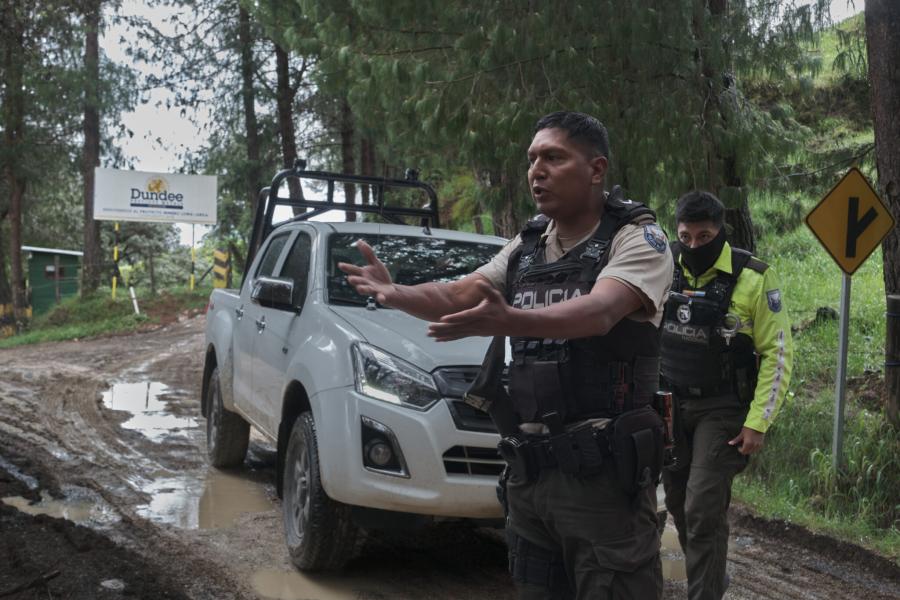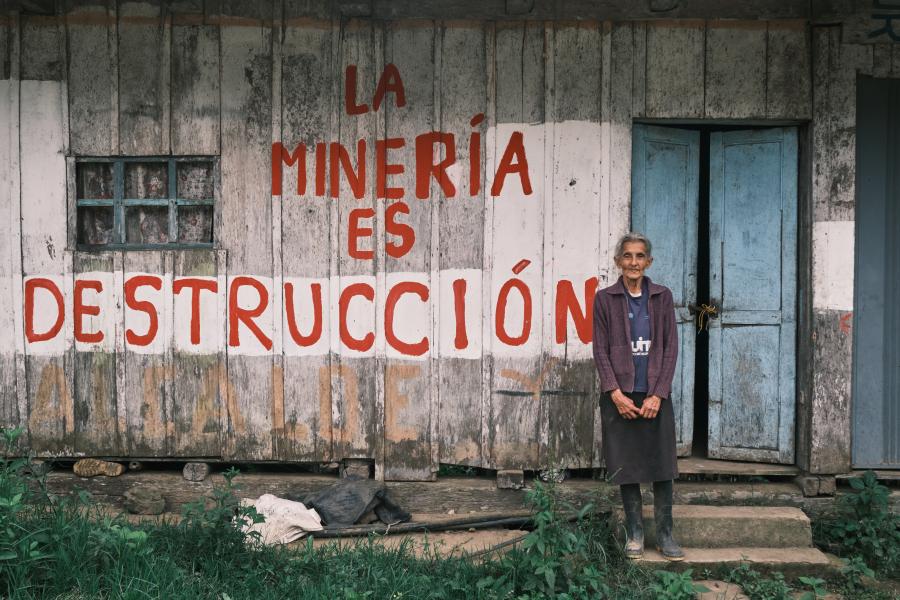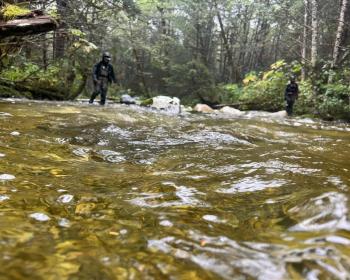The Oka Crisis
As readers of Cultural Survival Quarterly will doubtless know, the Mohawk crisis at Oka, Kahnasate, Quebec, ended without further loss of life (one Quebec police officer was killed earlier in the crisis). The issue of land rights is hardly resolved, however. Mohawk Warriors who has held out for months, ultimately taking shelter in a drug rehabilitation center, surrendered to the police last September. But the whole confrontation has left lasting scars on the Canadian psyche. Canadians like to think of themselves as rational, "civilized" people. Some of the images of Oka and Chateauguay (Kahnawaga), Quebec, seemed to come from another country: the vacationing construction workers on the Mercier Bridge burning a Mohawk Warrior in effigy; the crowds of hostile Quebecers stoning cars carrying women, children, and elderly to whom the police had promised safe passage.
In early January another protest began in the woods near the Oka golf course: Mohawk women protested the beginning of surveying work on a housing development on land they consider sacred. Although the federal government claimed to have purchased all the disputed land in order to resolve the controversy, the Mohawk have charged that the government bought the land without a survey, ignoring Mohawk advice that one be obtained. The result is that the government seems to have bought swamp land and not the disputed pine forest. As a result Mohawk protesters were back in the news, on a long, cold vigil against the destruction of their territory. There have been skirmishes with police at Kanawake in Montreal - a result, according to the native people, of police harassment since the events of the summer. The Quebec Provincial Police are considering the purchase of three Leopard tanks to deal with future native protests (Leopard tanks are the main battle tanks for forces in NATO). In January, a commission from the European Parliament to look into human rights visited both Kanawake and Kanasetake to hear from the native people.
James Bay
Meanwhile, the hottest environmental battle in Quebec, and indeed an issue of national and international importance, is being fought by the Cree and Inuit of the James Bay region of northern Quebec. Relations between Canada's First Nations and the Quebec provincial government, which were never strong, have been eroded further by the Oka crisis. First Nations Chief George Erasmus told reporters that Quebec has the worst record of any province in Canada in treatment of native people. Premier Robert Bourassa denied the charge, and indeed the record of other provinces in relation to First Nations is so dismal that he was not without supporters.
As the relationship between Quebec and the rest of Canada deteriorates, the relationship between Quebec and its predominantly non-French-speaking native minority has also worsened. What impact all of this ultimately will have on the James Bay controversy is not clear.
Hydro Qyebec plans to start construction on the next phase of its massive hydroelectric complex at James Bay in April 1991. It will begin by building hundreds of kilometers of roads, airports, and other aspects of the access infrastructure that supports the construction of the project as a whole. The next dams are slated for the Great Whale River, which will be diverted along with two other rivers. Five dams and 133 dikes will hold back the waters that once rushed into Hudson's Bay and create a reservoir of 4,387 km2.
The last phase will be even more devastating. Three large wild rivers will be destroyed to create power for export to the United States. The Nottoway and Rupert rivers will be diverted into the Broadback River. Sixteen dams, 115 dikes, and eight power stations will be built as part of the "NBR project." All of this is to take place on what has traditionally been Cree land. The total area of the reservoirs will be the size of Lake Erie.
The Cree have launched several court challenges, but Hydro Quebec plows ahead. The federal government has caved in, allowing the environmental assessment of the project to be split in two. The federal government will allow Quebec to treat the building of "access infrastructure" as separate from the building of the project as a whole. Based on this fiction, Hydro Quebec can start building roads, even before the joint federal-provincial environmental assessment review panel has begun its work. Once the roads are built there will be a great momentum to continue the project regardless of the findings of an environmental assessment. Cultural Survival (Canada) is working closely with the Cree and with an international coalition working to stop the dams.
The Penan
For the first time in their history, several Penan tribesmen left their home in Borneo for an international fundraising and awareness-raising tour. They wanted to attract international attention to the rapid logging of their rainforest home.
Cultural Survival (Canada) was one of the sponsors of the world tour, which included Japan, Australia, Europe, the United States, and Canada. Mutang T'uo, a young Penan tribesman, visited Ottawa, where CSC hosted a fundraising dinner and arranged meetings with political leaders, including the leader of the New Democratic Party, the speaker of the House of Commons, and representatives of our minister for external affairs. The Malaysian Embassy in Ottawa was well aware of the sympathetic and supportive reaction from Canadians to the plight of the Penan.
UNCED
Throughout the month of August, CSC's executive director, Elizabeth May, was in Nairobi, Kenya, as part of the official Canadian delegation for the meeting of the Preparatory Committee to the United Nations Conference on Environment and Development (UNCED). The UNCED conference will take place in Rio de Janeiro in June 1992 and will deal with the full range of planetary environment and development issues. The UNCED itself will be a summit of heads of state meeting to finalize a series of legally binding conventions, protocols, and declarations. The negotiation process has begun on two of the key issues - climate change and biodiversity - and discussions have started on a global forest convention, dealing with protection of tropical and temperate forests.
Because the conference will take place in Brazil, it has created new opportunities for networking with Brazilian groups. The Brazilian NGOs have organized themselves for the first time into a coalition of environment, native, development, and human rights groups. The "Forum," as it is called, is organizing within Brazil to increase its voice at the international conference. Cultural Survival (Canada) has received funding from the Canadian government's and division, CIDA, to assist the Forum in developing its computer communications capacity. Computer conferencing is proving to be a cost-effective method of networking both nationally and internationally. With funding for this project, we hope to provide computers and modems for important Amazonian groups such as the Conselho Nacional dos Serengueiros.
Article copyright Cultural Survival, Inc.



